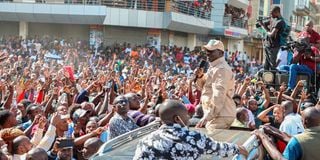Premium
What Raila Odinga wants, and what he does not want to achieve

Opposition leader Raila Odinga addressing the demonstrator in Eastleigh Nairobi on March 20, 2023.
When you have a moment, attempt to arrive at a clear understanding of what Raila Odinga wants, or does not want to achieve, with his ‘peaceful protests’, ‘mass action’ or demonstrations.
On first impressions, Odinga appears to have heroically embraced the noble undertaking of holding the government to account and championing on behalf of the voiceless masses, measures to bring down the cost of living.
Anyone credulous enough to adopt this perspective immediately crashes headlong into one monumental contradiction: until August last year, Odinga was the de facto government spokesman.
In this role, he held forth expansively and confidently, giving no quarter to Kenya Kwanza’s pledges to bring down the cost of living within its first year in office.
Demonstrating hubris and scorn, Odinga described the cost of living discourse as populist politics. He went further to authoritatively elucidate causes beyond the control of the government that made the unbearable cost of living a universal global headache, including the war in Ukraine, persistent drought and the upheaval wreaked by the pandemic, among others.
Back on the streets, Odinga demands that the government must bring down the cost of living immediately, or he will basically overthrow it through popular action.
He has been unable to cite, in any of his gatherings, a single basic commodity whose price remains where Azimio left it or has risen higher. The rains are here and farmers are planting all over Kenya. Subsidised fertiliser and other inputs reached them in good time and there is every reason that food prices will steadily come down.
Odinga’s stated second key mobilising agenda is the last election. Constitutionally, that matter is closed, after all, relevant institutions formally pronounced themselves with clarity and credibility.
A few weeks after the Supreme Court decision, a terse notification from the chairman of the IEBC invited participating parties to attend the scrutiny of the data in the contentious server. The chairman was emphatic that this invitation and exercise was in furtherance of the Court’s direction.
Azimio La Umoja, ordinarily deafeningly cacophonous an organisation at the best of times, was notable for its silence and unresponsiveness in the wake of this invitation. On the streets, however, Azimio and Odinga are a different matter altogether.
Their clamorous demands, reinforced with histrionic menaces, pronounce their categorical intent regarding the now urgent opening of the server. Odinga, in particular, vehemently appeals to the mystifyingly oracular and arguably apocryphal guidance of a whistleblower who emerged in time for street mobilisations and exercises a most hypnotic hold on his imagination.
Cherera Four
Odinga also spices his agenda with advocacy of the IEBC’s notorious Cherera Four, whose disgraceful exploits during the election brought much heat and no light. He goes further to demand extra-legal innovations in the constitution of the commission.
Apart from the big three demands, Odinga’s agenda appears to possess a snake-like agility and chameleon-like capacity for spontaneous transformation, depending on no reason at all whatsoever. The agenda seems to be one demanding with menaces, no matter the content of the demands.
Similarly, Odinga’s commitment to the ‘peaceful’ component of peaceful demonstration is, at best, only formal. Although his minions are quick to escalate confrontations with the police as prima facie evidence of repressive crackdowns of a tyrannical state, they are famously lethargic in acknowledging that a lot of ‘peaceful’ street activity at Odinga’s has entailed systematic violent attacks on police and uninvolved members of the public, robbery and looting of business premises, and the wanton arson and destruction of property.
Indeed, the reasons why Odinga’s avocations of democracy, freedom, human rights and the rule of law collapse spectacularly once he mobilises peaceful protests, encapsulate Odinga’s strategic dilemma. At their core, Odinga’s reasons matter only for reputational purposes, but they are ultimately and firmly subordinate to his end: the achievement of extra-constitutional political advantage.
For this reason, Odinga’s means must be sufficiently drastic to constitute adequate leverage and necessitate an extra-constitutional political settlement. This can only occur if he mobilises enough to bring national existential precarity, whether real or perceived, ominously close.
Picketing, demonstration and other forms of lawful protest are grievously deficient for the ends of extra-constitutional political advantage. But they are not only constitutionally protected as fundamental human rights, but they are also internationally safeguarded in the multilateral treaties and special instruments, including the various resolutions that institute the United Nations Special Rapporteur on Peaceful Assembly.
To resolve this dilemma, Azimio has mobilised to take advantage of the immunities guaranteed for peaceful assemblies and undertake significantly more drastic actions.
This is why peaceful demonstrators who engage in looting are routinely re-characterised as goons or unidentified people. The distinctions and contradictions subsist, and occasion tremendous confusion in understanding what Odinga wants, and what he does not want.
Like a despot who takes advantage of sovereign immunity to commit crimes and loot national coffers, Odinga’s peaceful protests are abusing constitutional immunities to undertake unconstitutional actions. Always remember that his innumerable and constantly varying reasons do not matter; only the objective matters.
Mr Ng’eno is an advocate of the High Court





